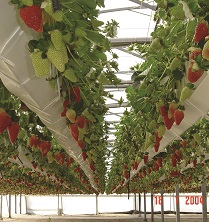Controlling the Growing Environment
There are many elements to consider in the growing environment, including the crops being grown, and systems being used. The following are three examples:
Light levels
 Light is the source of energy for plants. Light energy combined with carbon dioxide and water is required for the process of photosynthesis. Therefore, it is important to ensure the maximum light intensity possible is provided to achieve optimum plant growth, particularly during lower light times of the year. The design of the growing structure and the orientation as well as natural light levels and shading determine the light intensity.
Light is the source of energy for plants. Light energy combined with carbon dioxide and water is required for the process of photosynthesis. Therefore, it is important to ensure the maximum light intensity possible is provided to achieve optimum plant growth, particularly during lower light times of the year. The design of the growing structure and the orientation as well as natural light levels and shading determine the light intensity.
Other factors effecting light include the frame itself, if timber is used for the frame it must be painted white to reflect the light, the covering material, glass transmits up to 89% of light, polyethylene 84% and fibreglass starts high but quickly diminishes as the material hazes from the UV rays. The covering material accumulates dust and grime, which reduce the light intensity by up to 20%. Therefore it is essential, that after the hottest part of the summer, the glass is cleaned. Plant density, growing system – multi-level or single level and training method also determine the amount of light available for each plant and should be taken into consideration for each season. High light levels can be just as damaging as low radiation levels and often some form of shading is needed in summer for even high light crops, depending on the local climate.
Root zone temperature
Just as in soil, hydroponic growing substrates typically run temperature conditions a few degrees lower than that of the air. However, hydroponic crops are grown in limited volumes of media which has the ability to warm faster than soil and this should be taken into consideration in warm climates where root overheating can cause growth problems.
In solution culture systems such as NFT and Aeroponics the nutrient can over heat rapidly during the day and may need some form of cooling. Conversely in winter, solution or root zone heating with a warmed nutrient solution can boost growth, particularly when air temperatures are being run on the cool side. Cool season crops such as lettuce benefit from solution warming in winter, but in tropical climates, solution cooling can mean economic crops of lettuce can be produced at air temperatures much higher than ideal. Root zone temperatures should always be monitored and adjusted for hydroponic crop production.
Day length manipulation
The purpose of day length manipulation is to control flower growth. Flowers such as chrysanthemums are grown for an initial period under short night conditions to develop a plant of suitable size to support large flowers and tall stems, and then the plants are grown under long night conditions to induce flower growth and development.
Short night treatment simply entails turning on the lights in the late afternoon, to extend the day into the evening, or they may be turned on during the night to break the dark period.
After a period of short nights and the plant is established, a period of long nights must be introduced to initiate flowering. During winter the nights may be long enough, however, during summer, it will be necessary to cover the plants in late afternoon and remove the cover in the morning. Automatic equipment operated on a timer is available to perform this operation.
Develop expert knowledge for working in commercial hydroponics
Study the Certificate in Commercial Hydroponics to gain knowledge that you can apply in a commercial environment.
- Develop your knowledge of site and crop selection.
- Learn about different systems, their components, their management and selecting the right systems for the crop being produced.
- Learn about managing systems, environments, crop growth and much more.
You can enrol on the Certificate in Commercial Hydroponics at any time. You study by distance learning with the help and support of our specialist Hydroponic tutors.
Is this the right course for you? If you have any questions or would like help in choosing the right course to meet your goals - please get in touch with our specialist Hydroponic tutors today. They will be pleased to help!
WHAT SETS ACS APART?
At ACS we provide you with more than just a set of course notes.
Your 'learning package' includes:
- Course notes.
- Self-assessment quizzes.
- Assignment feedback.
- You can interact one on one with a professional tutor with decades of experience - just email, phone or log on to chat to connect with them.
- Depending upon your course, your studies may involve independent research, interviews, practical exercises, assessments, Problem Based Learning projects, and more.